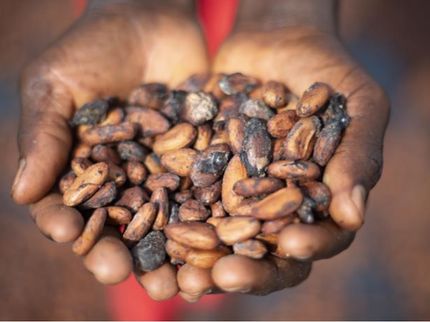Chocolate Scorecard 2025: Another top ranking for Ritter Sport
In the Chocolate Scorecard, the Australian initiative Be Slavery Free evaluates the sustainable cocoa sourcing of the most important chocolate companies. This year, Ritter Sport is once again among the top four companies worldwide and is recognized as "Leading the industry on policy and implementation". Ritter 2025 was once again able to significantly increase its overall score. The scorecard is the only international ranking for sustainability in the cocoa sector.

"Sustainable cocoa sourcing is in everyone's interest", Asmus Wolff, Managing Director Supply Chain
Alfred Ritter GmbH & Co.KG
"The fact that we continue to rank well ahead of our major competitors in this year's scorecard is a great confirmation of our work. It shows that we are further ahead than many others, " emphasizes Asmus Wolff, Managing Director Supply Chain at Alfred Ritter GmbH & Co. "Not only the results of the top group make it clear that something is happening in the industry and that many well-known companies are actively working to improve conditions, which we very much welcome."
Ritter itself has been committed to sustainable cocoa cultivation for around 35 years and has been working intensively for a long time to achieve the greatest possible transparency along the entire supply chain. Today, the cocoa for Ritter Sport chocolate is not only certified, but also traceable. This transparency is important to Ritter. Because only those who know where the cocoa comes from can do something to ensure that nature and local people are better off. To this end, the family business from Waldenbuch in Swabia has established so-called cocoa programs in all countries from which it sources cocoa. The aim of these programs is to work with local partners to bring about a positive change in social, ecological and economic conditions in cocoa cultivation through concrete measures.
Part of the cocoa programs is, for example, the promotion of cultivation in the agroforestry system, an ecologically sound mixed culture. In 2023 and 2024 alone, a total of around half a million shade tree seedlings were distributed to cocoa farmers in West Africa and Latin America. Sustainable methods such as cultivation in agroforestry systems are primarily used to make cocoa farming more resilient.
"We are currently experiencing the effects of failed harvests as a result of climate change," explains Asmus Wolff. "Crop failures are initially problematic for farmers. If demand then exceeds supply and commodity prices explode, this puts a strain on everyone involved in the supply chain - and ultimately on consumers too. Sustainable cocoa sourcing always serves to secure raw materials in the long term and is therefore in everyone's interest," says Wolff.
Comprehensive documentation on cocoa sourcing and all programs at Ritter can be found in the Ritter Sport Cocoa Report, the next edition of which will be published in the summer. The Cocoa Report 2023 is available to the right of the article.
Note: This article has been translated using a computer system without human intervention. LUMITOS offers these automatic translations to present a wider range of current news. Since this article has been translated with automatic translation, it is possible that it contains errors in vocabulary, syntax or grammar. The original article in German can be found here.
Most read news
Organizations
Related link
Other news from the department business & finance

Get the food & beverage industry in your inbox
By submitting this form you agree that LUMITOS AG will send you the newsletter(s) selected above by email. Your data will not be passed on to third parties. Your data will be stored and processed in accordance with our data protection regulations. LUMITOS may contact you by email for the purpose of advertising or market and opinion surveys. You can revoke your consent at any time without giving reasons to LUMITOS AG, Ernst-Augustin-Str. 2, 12489 Berlin, Germany or by e-mail at revoke@lumitos.com with effect for the future. In addition, each email contains a link to unsubscribe from the corresponding newsletter.


























































